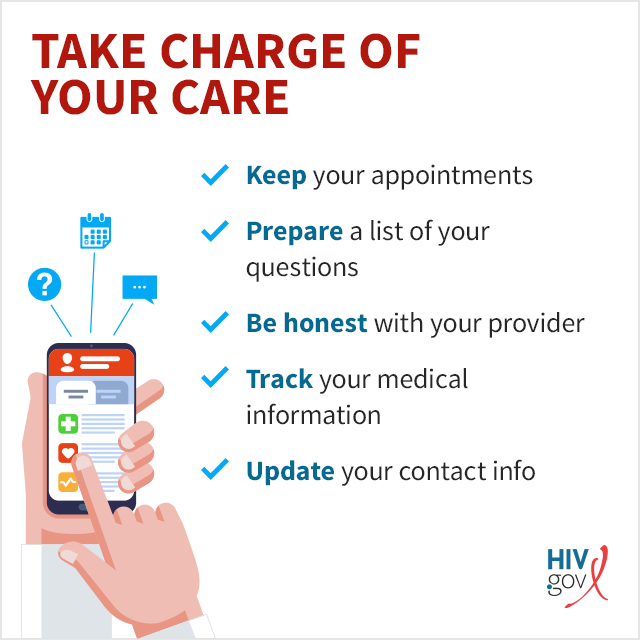Take Charge of Your HIV Care
Content From: HIV.gov•3 min read
Topics

How Can You Work Best with Your HIV Health Care Team?
HIV treatment is most successful when you actively take part in your medical care. Here are some ways you can take charge of your care and get the best results:
- Keep all your medical appointments. Seeing your health care provider is important so they can work with you to choose the best HIV treatment regimen for you and make sure your treatment is working. There are many tools you can use to help you remember and prepare for your appointments. You can:
- Use a calendar to mark your appointments.
- Set reminders on your phone.
- Download a free app from the internet to your computer or smartphone that can help remind you of your medical appointments. Search for “reminder apps” and you will find many choices.
- Ask your provider’s office for an appointment card. Keep it in a place where you will see it often, such as on a mirror or on your refrigerator. They may also be able to email or text you an appointment to add to the calendar on your phone or computer.
- Opt-in to reminder emails or text messages from your provider if they offer them.
- Ask a family member or friend to help you remember your appointment.
- Alert your provider if you need to cancel. If you can't keep a scheduled appointment, contact your provider to let them know and make a new appointment as soon as possible.
- Be prepared for your medical appointments. Before an appointment, write down questions or concerns you want to discuss with your health care provider. Be prepared to write down the answers you receive during your visit. (The Department of Veterans Affairs offers a useful list of sample questions.)
- Communicate openly and honestly with your health care provider. Your provider needs to have the most accurate information to manage your care and treatment. Tell them about your current and past sexual activities or alcohol/drug use. These can affect your risk of developing drug resistance or getting other sexually transmitted infections (STIs) as well as viral hepatitis. Your provider will work with you to develop strategies to stay as healthy as possible.
- Keep track of your medical services. You may have multiple health care providers working on your health care team. Keep records of your lab results, medical visits, appointment dates and times, medicines and medicine schedules, and care and treatment plans.
- Update your contact information. Make sure your health care providers have your correct contact information (telephone number, address, and e-mail address) and let them know if any contact information changes.
- Add contacts to your phone. Save your health care provider’s and pharmacy’s numbers in the contacts of your phone so you know who it is when they call you and don’t ignore an unfamiliar number.
- Continue to learn about HIV. The more you learn about HIV, the better you will be at making decisions about your health. You don't have to learn everything all at once. It is important to go at a pace that is comfortable for you. HIV.gov’s HIV Basics pages are a great place to start.
Learn more about Seeing Your Health Care Provider.
Updated: September 18, 2025